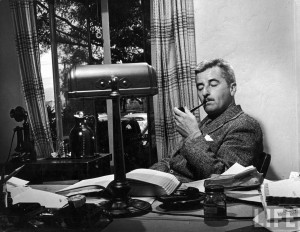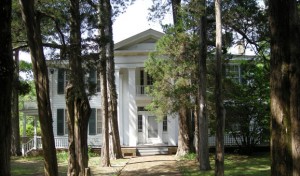The past is never dead. It’s not even past.
–William Faulkner, Requiem for a Nun
 Nobel Prize-winning author William Faulkner is one of the best-known of Southern writers, if not the preeminent one. His rich and evocative writing style is unparalleled and very different from many of his contemporaries, most notably Ernest Hemingway. Where Hemingway is spare, direct, and laconic, Faulkner is lush, meandering, and protracted. One famous Faulkner sentence, located in the middle of Absalom, Absalom!, runs for 1,288 words. In that sense, Faulkner’s writing is much like the South he loved and sought to preserve on the page: a complicated, tangled mixture of the lyrical and the everyday.
Nobel Prize-winning author William Faulkner is one of the best-known of Southern writers, if not the preeminent one. His rich and evocative writing style is unparalleled and very different from many of his contemporaries, most notably Ernest Hemingway. Where Hemingway is spare, direct, and laconic, Faulkner is lush, meandering, and protracted. One famous Faulkner sentence, located in the middle of Absalom, Absalom!, runs for 1,288 words. In that sense, Faulkner’s writing is much like the South he loved and sought to preserve on the page: a complicated, tangled mixture of the lyrical and the everyday.
Faulkner was born in Mississippi in 1897. He began writing as a young man. When World War I broke out, Faulkner attempted to enlist in the Army, but his age and height (he was only 5’5-1/2″) kept him out. Undaunted, Faulkner went to Canada to enlist in the British Royal Flying Corps. Despite never actually serving, he was fond of wearing his uniform and carrying the swagger stick he’d been issued. Soon after, he moved to New Orleans to begin his writing career. His first novel, Soldier’s Pay, was published in 1925. Apart from this brief period in New Orleans, occasional stints as a Hollywood screenwriter in the late 1930s and early 1940s, and as a writer in residence at the University of Virginia in the 1950s, he primarily lived and worked in his hometown of Oxford, Mississippi. He once remarked, “I discovered my own little postage stamp of native soil was worth writing about and that I would never live long enough to exhaust it.”
He was right. His interwoven collection of short stories and novels focused on his own back yard. Lafayette County became the fabled, fictional Yoknapatawpha County, whose families, history, and tales reflected both the high-minded ideals of the mythical South and the tangled, messy actualities of a region marked by pride, poverty, social status, and segregation.
 Rowan Oak, Faulkner’s home, is now owned and operated as a museum by the University of Mississippi. The house is preserved much as it was in Faulkner’s day. His Underwood typewriter sits ready on a desk, while riding boots rest on the floor next to a chair. A full outline and story notes for one of his last published works, A Fable, are penciled across the walls of his study. Faulkner’s connection to this house was legendary. One story goes that during one of Faulkner’s screenwriting jobs, the studio put him in an office and left him to work. After some time passed without much output, Faulkner said he thought he could write better from home, and the studio agreed. More time passed without any production, so the studio sent someone to Faulkner’s temporary California apartment—and he wasn’t there. When he asked to write from home, he meant Rowan Oak. They called and sure enough, Faulkner was in Mississippi, proving what he wrote for The Paris Review in 1956: “An artist is a creature driven by demons. He don’t know why they choose him and he’s usually too busy to wonder why. He is completely amoral in that he will rob, borrow, beg, or steal from anybody and everybody to get the work done.”
Rowan Oak, Faulkner’s home, is now owned and operated as a museum by the University of Mississippi. The house is preserved much as it was in Faulkner’s day. His Underwood typewriter sits ready on a desk, while riding boots rest on the floor next to a chair. A full outline and story notes for one of his last published works, A Fable, are penciled across the walls of his study. Faulkner’s connection to this house was legendary. One story goes that during one of Faulkner’s screenwriting jobs, the studio put him in an office and left him to work. After some time passed without much output, Faulkner said he thought he could write better from home, and the studio agreed. More time passed without any production, so the studio sent someone to Faulkner’s temporary California apartment—and he wasn’t there. When he asked to write from home, he meant Rowan Oak. They called and sure enough, Faulkner was in Mississippi, proving what he wrote for The Paris Review in 1956: “An artist is a creature driven by demons. He don’t know why they choose him and he’s usually too busy to wonder why. He is completely amoral in that he will rob, borrow, beg, or steal from anybody and everybody to get the work done.”
Faulkner’s life was marked by excesses—his concentration on his work, his home, his alcohol consumption (he did not drink while writing but often binged afterward). He won the Pulitzer Prize for fiction in both 1955 and posthumously in 1963, and was awarded the Nobel Prize for Literature for his body of work in 1949. In his acceptance speech he remarked, “I feel that this award was not made to me as a man, but to my work—a life’s work in the agony and sweat of the human spirit, not for glory and least of all for profit, but to create out of the materials of the human spirit something which did not exist before. So this award is only mine in trust.” Hear a clip of his acceptance speech here.
Faulkner’s techniques, including his exploration of stream-of-consciousness writing, his invented verbiage, and his convoluted timelines, have earned him a permanent place near the top of the Southern literary tradition. Flannery O’Connor, another celebrated Southern author, stated that “the presence alone of Faulkner in our midst makes a great difference in what the writer can and cannot permit himself to do. Nobody wants his mule and wagon stalled on the same track the Dixie Limited is roaring down.”
For all kinds of great Faulkner resources, visit William Faulkner on the Web, hosted by the University of Mississippi.
“William Faulkner’s Hollywood Odyssey,” by John Maroney about Faulkner’s screenwriting days, was published in Garden and Gun magazine in 2014. Read it here.
